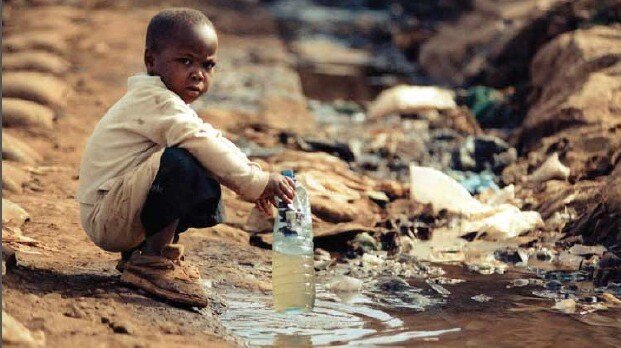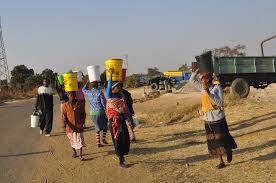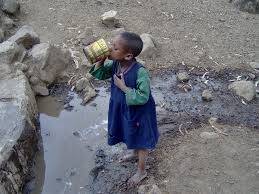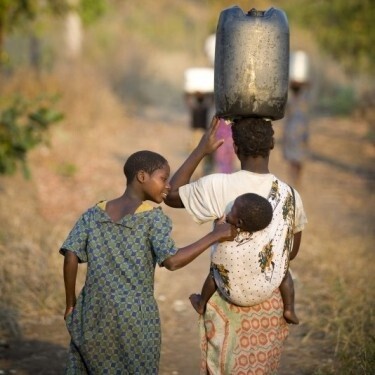
Access to safe water and proper sanitation are human rights. And these rights must be ensured for everyone, everywhere to live a dignified and healthy life.
A life free of preventable deadly diseases, children having to walk for miles in search of dirty water, assault on girls and women because they defecate in the open, sick children missing school and the continuous cycle of extreme poverty.

Thus, without clean water and proper sanitation, which are the rights of all humans, inequalities will grow, children’s development will be hindered, mothers will continue to die due to infections because midwives are unable to wash their hands and the entire 2030 Development Agenda will be held back.
“Clean water, decent toilets and good hygiene … together form an essential platform for progress in health, education, nutrition, work and economic development without which the 2030 Agenda for Sustainable Development will fail,” a new WaterAid document states.
Titled ‘How to reach everyone with safe water and sanitation by 2030’, the document opines that 31 percent of the world’s population still do not have access to basic sanitation and more than three in ten people lack safe water.
Moreover, 35 percent of healthcare centres in low and middle-income countries have no water and soap for hand-washing, indicating billions of the most marginalised are being left behind.
“The global community is doing too little, too slowly, to fix it, urgent global and national level action on finance, integration and sustainability will change all this,” states the WaterAid document.

Malawi’s Situation Globally, 844 million people lack access to safe water and 1.7million Malawians remain without access to a safe water facility. WaterAid Malawi, says Malawi is struggling to meet the Sustainable Development Goals (SDGs) standards on safe water. One in 3 people in Malawi don’t have clean water.
WaterAid explains that the country is performing poorly on indicators like water source available at the premises when needed and regularly tested to make sure it is safe and proper management of water sources.
“Only 27 percent of Malawians meet this standard,” WaterAid adds.
WaterAid further notes that 78 percent of Malawians have basic access to an improved source of water within 30 minutes round trip to collect.
However, the country is faced with the daunting challenge of basic sanitation, with 86 percent of the country’s population not having a decent sanitation facility.
The Country Director of WaterAid Malawi, Mercy Masoo, says Malawi is in critical juncture in the fight to get clean water, decent sanitation and good hygiene to its people.
“We know that if everyone, everywhere was able to access clean water, decent toilets and good hygiene, then we could help end the scourge of extreme poverty and create a more sustainable future. But we have to act now to make this a reality,” she says.
Masoo indicates the need for government to prioritize water, sanitation and hygiene ensuring proper financing is put in place to build a more sustainable country today and for future generations.
“It is estimated that for every $1 spent on water and sanitation, on average $4 is returned in economic benefits. Water, sanitation and hygiene are a great investment,” he adds.

WaterAid warns that without access to these basic amenities, men, women and children in Malawi will remain trapped in a cycle of poverty and disease, while being denied their basic human rights to safe drinking water and sanitation.
Financing Safe Water and Sanitation Mercy Masoo says about $386 million is required annually to improve WASH access in the country.
He points out that looking at the investment being made in the WASH sector, the country will be able to deliver a community source of clean water within a 30-minute round trip to everyone by 2040.
“At this rate, universal access to water may be achieved by 2115 in Malawi. We all need to act now to get WASH to everyone, everywhere by 2030,” she says.
Community Involvement
It is one thing sensitizing the community and another thing having the community to buy into the idea and take initiatives on their own towards solving a challenge.
Thus, it was comforting to hear Tradition (T/A) Anderson Machinjiri in Blantyre, calling for stringent actions to be taken by his subject to immediately address the issue.
He says stiffer punishment for people who dump refuse and other waste products into water bodies and open gutters is one of the ways the issue could be solved.
The Traditional Authority says his community has been faced with the challenge of ensuring the water body in their traditional jurisdiction is not polluted.
But he says the influence of individuals in higher authorities, most of whom are not directly affected by the consequences of water pollution in the area interferes with rules and regulations set to protect the source of water.
“People put both liquid and solid waste disposal into drains and water bodies and when you arrest them and take them to the police station they will call someone and will be released,” he says.
The T/A, has directed his subjects, to be vigilant and ensure they stand up and protect their livelihood and the future of their children.

If Benedicto Chemebekezo and his wife Ndaziona Mabviko, first Machinjiri settlers, were alive today to witness the great stride Machinjiri community has attained, they surely would have been all smiles. The two used to brave the cold weather of the Machinjiri-Limbe belt journeying. from Chimwaza to Nthawira to fetch water for their family each morning.
However, their burden could not be missed by the alert eye of a Catholic priest, Father Arizeio Mutharika. One day as they were going to their morning routine errand, Father Mutharika had to summon them in his office.
“It appears we have two devoted parents from the north direction passing my church each morning, tell me, where do you come from?” he said, wearing a genuine smile on his face.
“From Chimwaza, Abambo,” they both chorused, happy that they had been noticed by a Catholic priest, hearing in their innermost that something fruitful was going to emerge from their brief chat.
“Where Chimwaza?” he wanted to know.
“Almost two kilometers after Nthawira parish. And this is my wife,” Benedicto who was an obvious husband to Mabviko said, adding, “In fact; we walk all the way to this place.”
Father Mutharika looked at them in the face and showed his remorseful face for the two natives.
“Your hardworking is amazing. You hardly miss a day not seeing you passing here, yet you are coming from very far. You are an example of true responsible parents.”
Two weeks later, Father Arizio left his fortification at Nthawira Parish and travelled the way to Chimwaza to meet the two dedicated parents. There was jubilation in Chimwaza village at seeing the Catholic priest. This was the beginning of great things to come.
With the help of a few natives and a little cash from Father Mutharika, a water borehole was erected in their village serving 23 families.













